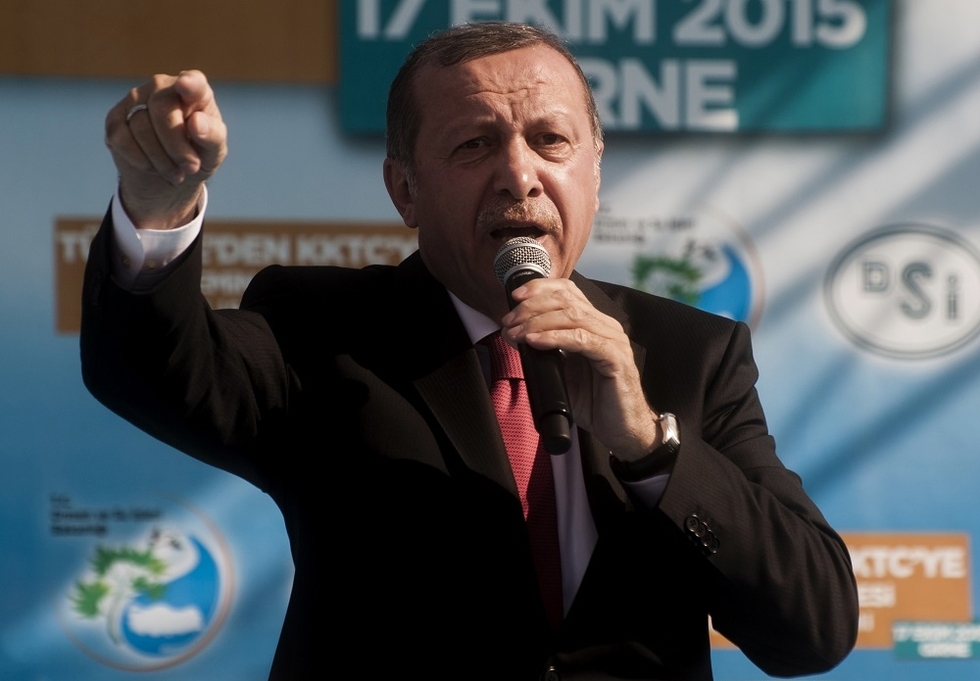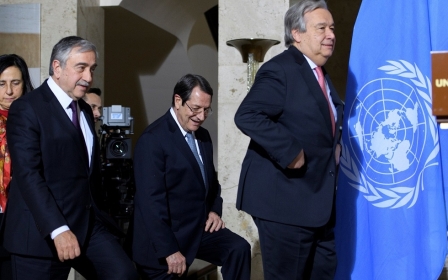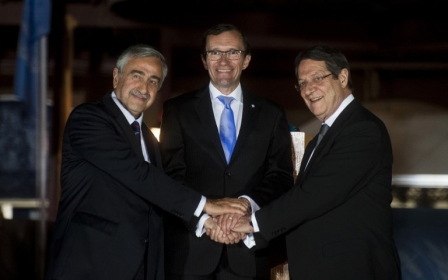Erdogan: Turkish troops will not be withdrawn from Cyprus

Hopes for a peace deal in Cyprus stalled Friday over a decades-old dispute, with the rival sides at loggerheads over the future of Turkish troops on the divided island.
Recep Tayyip Erdogan said it was "out of the question" for Turkey to withdraw its troops, and that Turkey would be on the island "forever", hours after leaders from the divided island said they had made significant progress on attempts at reunification.
The Turkish president's remarks on Friday were followed by Greek Cypriot president, Cypriot President Nicos, saying that any deal to reunify the island must include the withdrawal of the 30,000 Turkish troops from the north.
"Our position remains... that we must agree on the withdrawal of the Turkish army," he said.
Erdogan, speaking in Istanbul, said Greek and Greek Cypriot leaders had "different expectations" on resolving the division, following crunch talks this week in Geneva.
"We have told Cyprus and Greece clearly that they should not expect a solution without Turkey as guarantor. We are going to be there forever," he said, adding that Turkish Cypriots were "working intensely and bring sincerity".
A full withdrawal of Turkish troops from northern Cyprus was "out of the question... This is what we had previously discussed," he added.
Greece later said there was no solution to Cyprus until the Turkish "occupation" had ended.
"A just solution (to division) means, first of all, eliminating what caused it, namely the occupation and presence of occupation forces," said the foreign minister, Nikos Kotzias.
Greece has a batallion of about 1,100 troops on Cyprus. Erdogan says there is a plan for 650 Turkish troops and 950 Greek troops to remain on the island after a settlement.
'Real progress' on unity
The statements came hours after the rival Cypriot leaders pledged to forge ahead with reunification efforts after making "real progress" at a high-level international conference in Geneva early on Friday
The United Nations' new secretary general, Antonio Guterres, said a final deal was "close" but warned against expecting a "quick fix".
The eastern Mediterranean island has been divided since 1974, when Turkish troops invaded in response to an Athens-inspired coup seeking union with Greece.
Technical experts from all sides were set to continue negotiations in Geneva on Friday, but the British, Greek and Turkish foreign ministers, who were all in Geneva for the main talks, were not expected to take part.
"We are coming very close" to a deal, said Guterres, while warning major work remained on how to implement and guarantee a lasting peace.
"You cannot expect miracles or immediate solutions. We are not looking for a quick fix," he said.
"We are looking for a solid sustainable solution."
British Foreign Secretary Boris Johnson said "real progress" had been made.
"With continued commitment and political will, I believe a historical agreement is within reach," he said in a statement.
Drilling down into details
The UN said technical talks involving Turkey, Greece and Britain would start on 18 January, alongside negotiations between the two rival Cypriot sides over outstanding issues.
A key sticking point however is the presence of some 30,000 Turkish troops on Cyprus as well as the role of Britain, Greece and Turkey, the so-called guarantor powers.
Under a 1959 treaty, those nations were allowed to intervene to defend the island's sovereign integrity, which Ankara used to justify its invasion.
Greece and the Greek Cypriot side wants the guarantor system scrapped and Turkish troops to leave Cyprus but Turkey is determined to keep a military presence.
Turkey's Foreign Minister Mevlut Cavusoglu said on Thursday that Turkish troops must remain on the island because "the reality is that Turkey's guarantorship is vital to Turkish Cypriot people".
Britain, which also retains military bases in Cyprus that are sovereign British territory, said it was happy to do away with the guarantor system if Cypriots asked, while Turkey insisted the arrangement must be preserved.
While Cyprus has been an EU member state since 2004, Anastasiades' internationally recognised government exercises no control over the northern Turkish-ruled part of the island, and EU legislation is suspended there until a settlement is reached.
New MEE newsletter: Jerusalem Dispatch
Sign up to get the latest insights and analysis on Israel-Palestine, alongside Turkey Unpacked and other MEE newsletters
Middle East Eye delivers independent and unrivalled coverage and analysis of the Middle East, North Africa and beyond. To learn more about republishing this content and the associated fees, please fill out this form. More about MEE can be found here.




